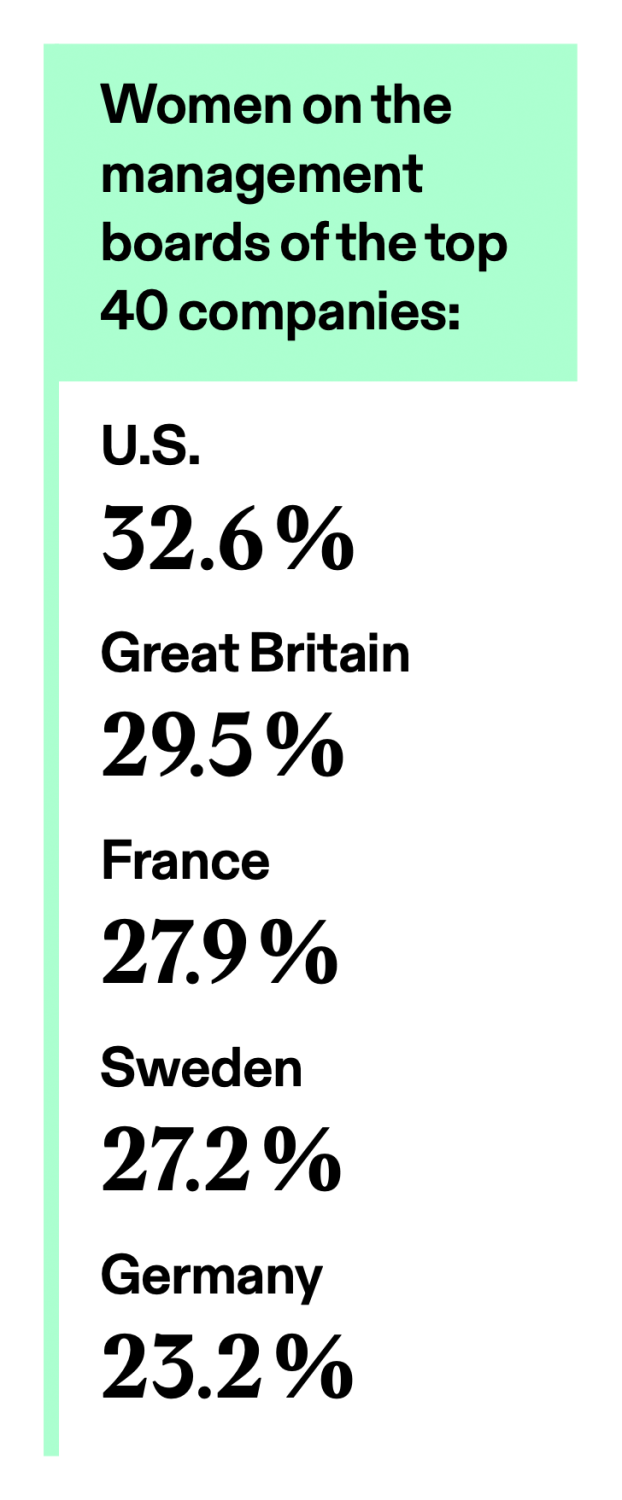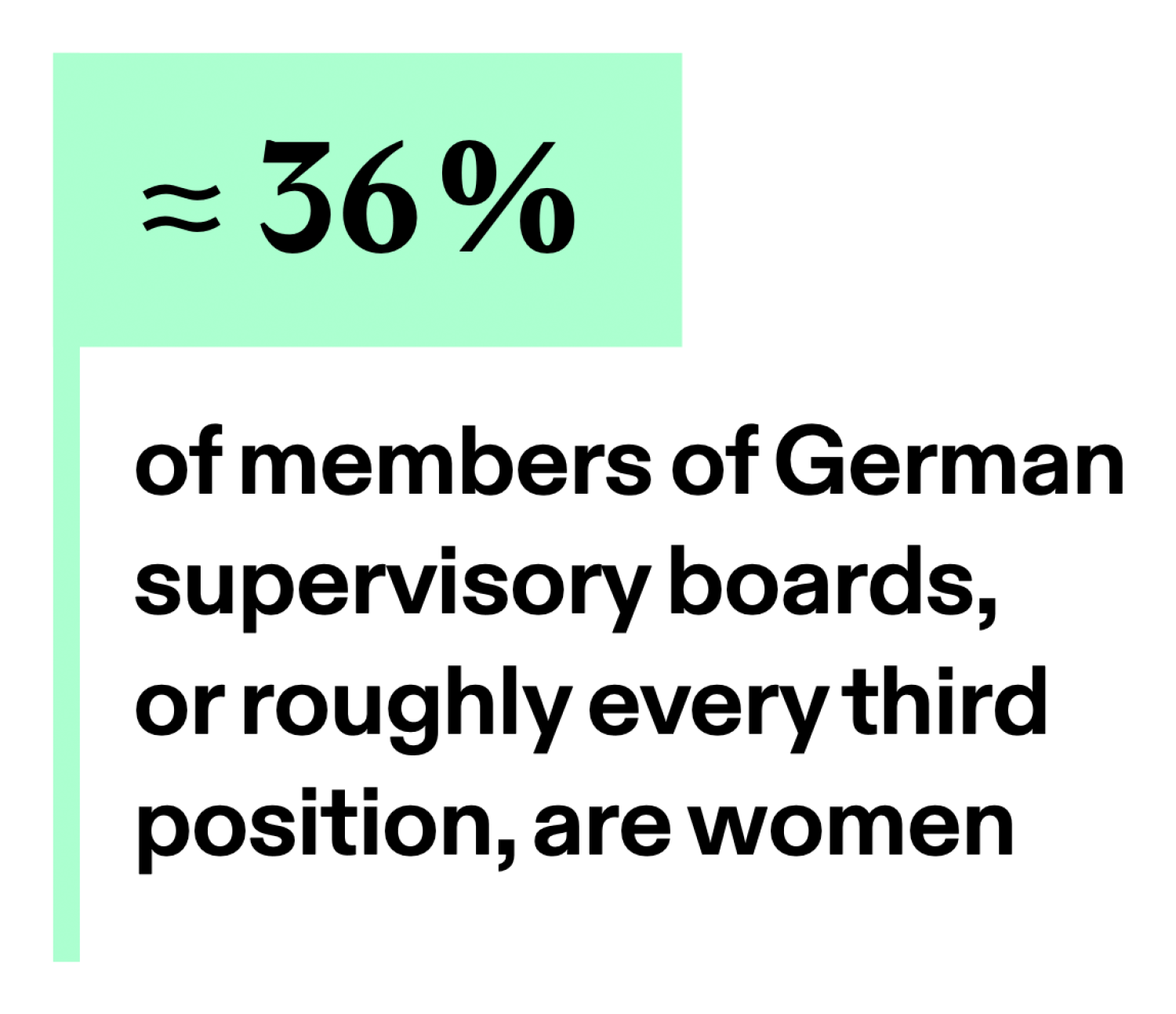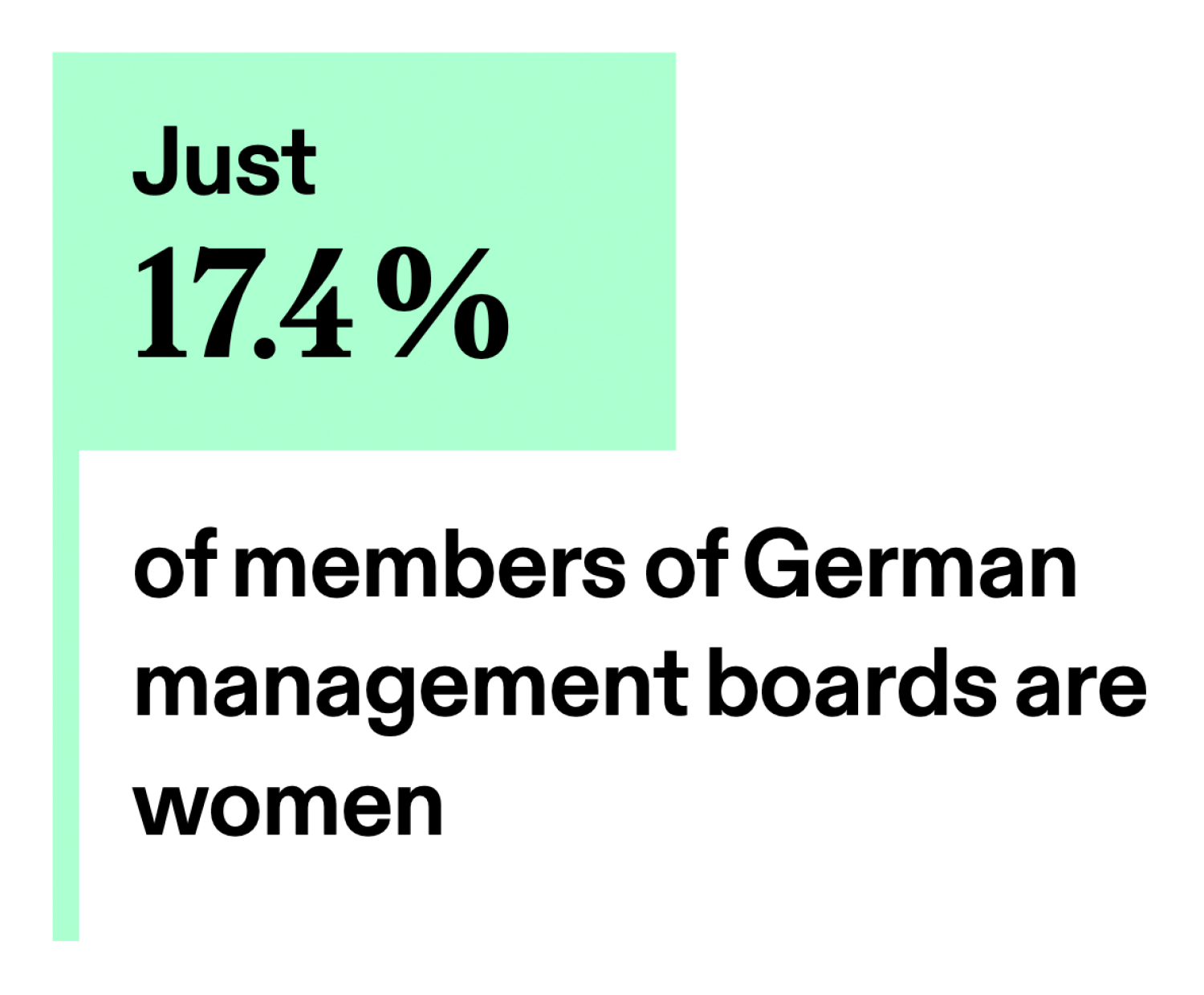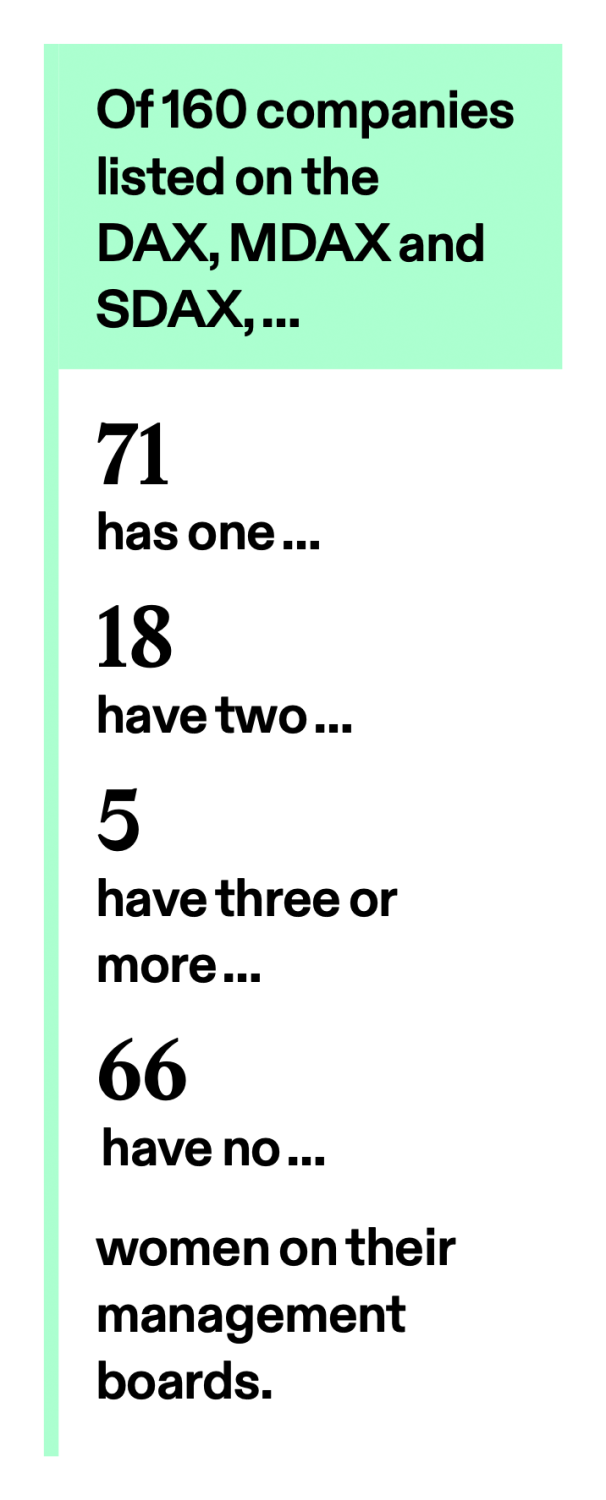The Male
Blueprint?
Analysis
If you count the number of female executives serving on management and supervisory boards in 2024, you will immediately see that the German business community is still struggling despite enormous efforts to improve the situation. To take a closer look at what is causing this, the strategic communications consultants at FGS Global teamed up with Egon Zehnder, a leadership advisory firm. Their findings: there is widespread awareness of the problem, as well as an abundance of ideas for addressing it. But if we are really serious about seeing more women at the top management level of German companies, then we will have to start by shifting our mindset. We will have to enact cultural change if we are serious about achieving long-term transformation – and top executives in management and supervisory boards must play a central role in this.
Breaking down a highly complex and multi-layered issue into bite-size nuggets is a difficult task. But FGS Global and Egon Zehnder pulled it off during one of the interviews conducted in recent months with 20 members of management and supervisory boards. Broadly, female executives remain rare creatures in top managerial boards despite government-mandated quotas and companies’ efforts to increase gender diversity on their management boards. One female manager described the situation in an interview with FGS Global and Egon Zehnder: “The fundamental mistake we make is that we measure everything against the male blueprint. Against a male CEO.”
This means that the work cannot end once quotas have been set and related measures have been put into place. The overarching and essential mission now is to set an evolution in motion, a transformation that will ultimately birth an inclusive culture. Our interviews with top managers showed that the challenge does not lie in the need for change being overlooked. The opposite is actually true, the interviews with top managers showed. Rather, the crux of the matter is that the individuals who serve on management and supervisory boards will have to be the people who fuel and shape this change. This will be a difficult task for them. And so it should, given the extremely homogeneous makeup of these boards in Germany until now. After decades of debate about gender quotas and diversity, the average member of a German management board continues to be male, German, born in 1969 and educated in western Germany – most likely with a major in business administration.¹
Such uniformity leads to enormous inertia and slows down change to a snail’s pace. Admittedly, the share of female executives on the managerial and supervisory bodies of the 160 companies listed on the DAX, MDAX and SDAX rose last year: an increase of more than 3 percent on management boards and 2 percent on supervisory boards. Still, Germany lags behind other major economies in the world.
Just over one in every three positions on German supervisory boards is filled by a female executive (over 36 percent). The total figure for female representation on management boards is just 17.4 percent. The figures at the top 40 companies listed on the DAX may look a little better on paper. But when these numbers, particularly in terms of management boards, are compared against those of other international companies, the picture is not so rosy. The total in the United States has already reached 32.6 percent, while boards in Great Britain (29.5 percent), France (27.9) and Sweden (27.2) have also outpaced Germany’s top 40 management boards (23.2).
A Woman on the Management Board
Still Isn’t the Norm
A Woman on the Management Board
Still Isn’t the Norm
A certain fatigue appears to have taken root; the authors of a new AllBright report note that the targets for female representation remain stubbornly out of reach. They also say that companies have settled into a new normal after shaking off the old way of doing things, when management boards were a men’s only club. Under the new normal, every management board has a female member – but just one. This is the case in 71 out of the 160 companies listed on the DAX, MDAX and SDAX. Only 23 companies have management boards that include more than one female executive. Just 5 (a grand total of three percent overall) have three or more female executives on their management boards. And more than a third of them – 66 of the top German companies – remain an exclusive all-male fraternity.
The problem also extends beyond the composition of management boards. Germany lags far behind other countries in terms of female representation in managerial positions overall (that is, the pool of talent from which individuals could be promoted to management boards and later to supervisory boards), not only at the highest echelons, according to the Federal Statistical Office of Germany.² Female executives made up about twenty-nine percent of German managerial ranks in 2022, compared to an average across the European Union (EU) of about 35 percent. As a result, Germany finished 21st on a ranking of the EU’s 27 member states.
One of our interviewees described the situation in this way: “Having female executives on the management board is now an accepted practice. But they remain something unusual. It still hasn’t become the norm.”
Searching for Solutions:
Escaping the Cliché Trap
Searching for Solutions:
Escaping the Cliché Trap
In their search for solutions, FGS Global and Egon Zehnder first analyzed the latest research findings. They then conducted interviews based on this information with 20 active and former female members of management boards, and with male and female current members of supervisory boards at the largest listed companies in Germany. They also discussed their findings with a researcher, Professor Dr. Isabell M. Welpe of the Technical University of Munich (see the interview).
During the process, they sought answers to one question: Why is change happening so slowly, particularly in light of the quotas that have been set and frequently expressed commitments to diversity? The resounding response was that a quantitative approach like quotas is clearly not enough to create fundamental change on its own. It will take a real cultural transformation to topple the notion of a male leader from people’s minds – and to rid them of the clichés that are so tightly interwoven with this mindset, such as the image of the lonely commander at the top. A real cultural change will require people to fundamentally rethink their attitudes and learn to interact with the world in a new way – a process that must start with every single individual. In other words, each of us must change if we really want Germany’s top managerial bodies (particularly management and supervisory boards) to have more women on board. This need applies in particular to CEOs and the chairs of supervisory boards.
I’m Out of Here:
Why Women Do Not Last Long on Management Boards
I’m Out of Here:
Why Women Do Not Last Long on Management Boards
The chairpersons of management and supervisory boards can and must become agents of change. They could start by examining such areas as the working conditions on Germany’s top managerial bodies and the communication practices of their members. Figures on this are primarily available for management boards, and frequently depict an inhospitable environment. Women who manage to reach this career peak do not stay long to savor the view from the top. Researchers at the University of Düsseldorf were commissioned in 2023 by the Sunday newspaper Frankfurter Allgemeine Sonntagszeitung (FAS) to analyze the composition of the management boards of companies listed on the DAX and MDAX since 2010.³ The result: male executives spend an average of six years and eleven months on the management board. In contrast, female members remain only 3 years and 2 months on average – not even half as long as their male counterparts.
This finding is partly explained by organizational and cultural factors. First, there are simply too few internal female candidates for management boards at most companies. As a result, female candidates for board positions are often external candidates. Companies also frequently recruit female management board members from non-German-speaking countries, according to research conducted in 2021 by the managerial consulting firm Horváth & Partners for the business newspaper Handelsblatt.⁴
The problem with this approach is that executives who do not know the organization and do not have networks in place are likelier to fail. Without networks and the ability to cobble together alliances to tackle challenges head-on, long-term success becomes something of a pipe dream. This applies to both male and female executives. “People who join a company from the outside have a much harder time than those individuals who are promoted internally,” one female interview partner said. “Outsiders frequently have a hard time deciphering the codes that you never see in the published figures. I’m talking about things like informal networks that shape a company’s culture.”
A female executive who receives an internal promotion to the management board will remain in this position for an average of more than 40 months – but external candidates will serve only 35 months on average.⁵ These external female members of management boards also frequently come from abroad, another disadvantage in the process – and not because the non-German members are less skilled at their management board jobs. The new woman sitting in the boardroom thus differs from her mostly male German colleagues in three ways: she is an external candidate, is a woman, and is not German. The implication: if a newly appointed female member of the management board were German, she would serve slightly more than 43 months on average in her position. The term in office is about 32 months for non-German female executives.
Second, studies conducted in the United States show that female executives in top managerial positions face higher structural expectations that are virtually impossible to fulfill – they are fired or forced to resign more frequently and have shorter times in office on average.⁶ Regardless of their qualifications and agreements, female members of management boards apparently have to prove over and over again that they are better than their male colleagues. But these male colleagues frequently cannot bear the thought of being shown up by their female colleagues. Or, as one of our interview partners noted: “Many people cannot stand to see you act as a demanding and assertive woman. A man is more willing to accept a strong man than a strong woman. Many of the women who recently left their management board positions at an early stage were strong women.” But it must also be noted that organizational and cultural factors do not explain all cases in which female members of management boards spend shorter periods of time in their positions than their male colleagues. There are naturally “individual cases of poor performance – just like men.”
Third, female members of management boards frequently hold positions with interdepartmental responsibility, in areas like human resources and finance. Only 2 percent of the female members of management boards who were appointed in 2022 were appointed CEO, according to figures compiled by the AllBright Foundation – compared with 14 percent of the newly appointed male executives. Male executives in interdepartmental positions also remain in office for shorter periods of time than in other positions, the FAS reported on the basis of information provided by managerial sources. One of our interview partners noted that male members of management boards frequently forced female executives serving as chief human resources officers to primarily focus on their own area of responsibility. “Their views about operational issues are not heard because other board members have no faith in their expertise.” But it gets even worse: “However, the entire management board has an opinion about the female member’s area of responsibility. As a result, every one of her proposals is commented on.”
Joint Task:
Companies and Society Benefit
from More Managerial Diversity
Joint Task:
Companies and Society Benefit
from More Managerial Diversity
The tide appears to be turning, however. In 2023, for the first time more female executives were promoted to the management board of the companies where they worked, as supervisory boards shifted from their long practice of favoring external candidates. The share of female executives has risen in all DAX indexes, and the greatest growth – 5.3 percentage points – has occurred at MDAX companies. At the time of this report, listed companies had announced the appointment of 11 new female members to their management boards. A small group of DAX40 companies even has at least 40 percent women on their management boards: Beiersdorf, Merck, Siemens Healthineers and Zalando. Allianz joined the group in January 2024 with 4 female board members.
These companies could benefit from their trail-blazing role, and they could do so in ways that extend beyond the impact of their decision to help close the gender gap among managers. Statistics clearly demonstrate that diverse teams boost company performance, provided that inclusive management breaks through cultural norms. A study recently conducted by the asset manager BlackRock reached a similar conclusion.⁷
A review of studies clearly shows that companies benefit from gender diversity in their managerial ranks. And female executives who are internally promoted are best equipped to establish themselves on the management board. Any company that is determined to add more diversity to its managerial bodies must above all create equal promotion opportunities for female and male executives – and this effort will require real change in the company’s culture.
Many quantitative analyses have been conducted into ways that Germany could progress faster in terms of gender diversity – but there is little qualitative insight on the topic. This is one of the conclusions that emerged from the in-depth interviews that FGS Global and Egon Zehnder conducted with female members of management boards and members of supervisory boards. One thought was expressed in all interviews: it will take a multi-layered and far-reaching effort to completely close the gender gap in managerial bodies. Such a shift can only be brought about if companies and society effect change within themselves – rather than passing this burden on to women, as is too often the case. The aim is to change deeply ingrained cultural standards.
Voices from Our Study:
Voices from Our Study:
“The fact that there are rarely women in top positions in this country shows that many companies lack a certain understanding. France and the United States are much farther along. They are not as biased. There are emotional and rational people, quiet and loud ones. This is not linked to gender.”
“Female members of management boards are completely normal in the U.K. and Scandinavia. It’s not like here where the motto seems to be: this is the management board, and here is our token woman.”
“The social framework of Germany makes it tougher for women to succeed in their careers. We in the West still have to explode many myths. Things like the myth of being completely on your own on the board and having no more friends or time. Sure, you cannot call all of the shots yourself, but you can certainly call more of the shots than you can on the levels below you. You have better control over the organization of your day.”
“I opposed a quota on supervisory boards. That was a mistake. The quota changes the atmosphere, including the one for other minorities like non-German employees. I have seen over and over again that women, of all people, are the ones with competence when it comes to integrating other minorities.”
1 AllBright Foundation, October 2023: Lonely at the top: Companies are adding women to management boards but usually just one
2 Federal Statistical Office of Germany, 2023: Women remain underrepresented in leadership positions
3 Frankfurter Allgemeine Sonntagszeitung, June 2023: Why women do not remain on management boards for long
4 Handelsblatt, March 2021: The characteristics of women who make it to Dax management boards
5 Based on own research
6 Glass & Cook, 2015: Leading at the top: Understanding women’s challenges above the glass ceiling
7 BlackRock, November 2023: Lifting financial performance by investing in women








